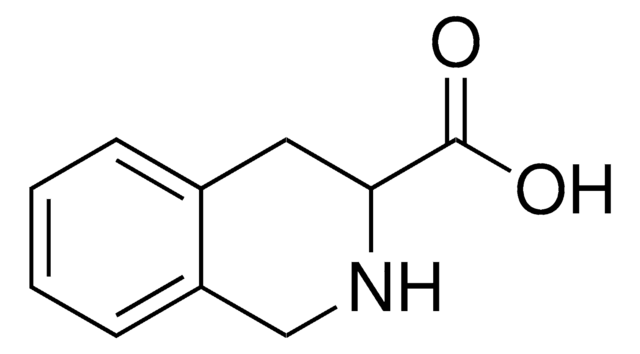421626
(S)-1,2,3,4-Tetrahydro-3-isoquinolinecarboxylic acid
97%
About This Item
Recommended Products
Quality Level
Assay
97%
form
solid
optical activity
[α]20/D −168°, c = 1.8 in 1.4 M NaOH
reaction suitability
reaction type: solution phase peptide synthesis
mp
>300 °C (lit.)
application(s)
peptide synthesis
SMILES string
OC(=O)[C@@H]1Cc2ccccc2CN1
InChI
1S/C10H11NO2/c12-10(13)9-5-7-3-1-2-4-8(7)6-11-9/h1-4,9,11H,5-6H2,(H,12,13)/t9-/m0/s1
InChI key
BWKMGYQJPOAASG-VIFPVBQESA-N
Looking for similar products? Visit Product Comparison Guide
Signal Word
Warning
Hazard Statements
Precautionary Statements
Hazard Classifications
Eye Irrit. 2 - Skin Irrit. 2 - STOT SE 3
Target Organs
Respiratory system
Storage Class Code
11 - Combustible Solids
WGK
WGK 3
Flash Point(F)
Not applicable
Flash Point(C)
Not applicable
Personal Protective Equipment
Choose from one of the most recent versions:
Already Own This Product?
Find documentation for the products that you have recently purchased in the Document Library.
Our team of scientists has experience in all areas of research including Life Science, Material Science, Chemical Synthesis, Chromatography, Analytical and many others.
Contact Technical Service







